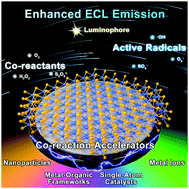Recent advances in co-reaction accelerators for sensitive electrochemiluminescence analysis
Abstract
In electrochemiluminescence sensing platforms, co-reaction accelerators are specific materials used to catalyze the dissociation of co-reactants into active radicals, which can significantly boost the ECL emission of luminophores. Deep insight into the correlation between the structure and ECL performance will guide the rational design of highly active co-reaction accelerators, which is imperative for constructing sensitive and reliable ECL biosensors. In this review, a brief introduction about the basic ECL mechanisms based on the co-reactant pathway is presented. After that, recent developments with various co-reaction accelerators are further discussed regarding different luminophore systems, including luminol, g-C3N4, quantum dots, nanoclusters and others. Furthermore, synergistic amplification strategies based on efficient co-reaction accelerators and enzyme immune and hybrid chain reactions are elucidated. Finally, the outlook for the preparation of high-performance ECL sensors with efficient co-reaction accelerators is discussed as well.



 Please wait while we load your content...
Please wait while we load your content...